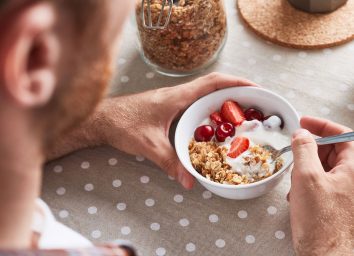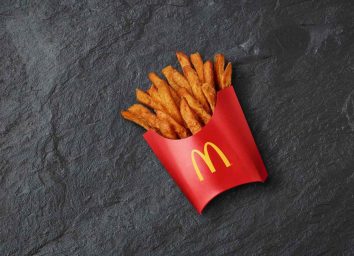McDonald's Entire Breakfast Menu—Ranked by Nutrition
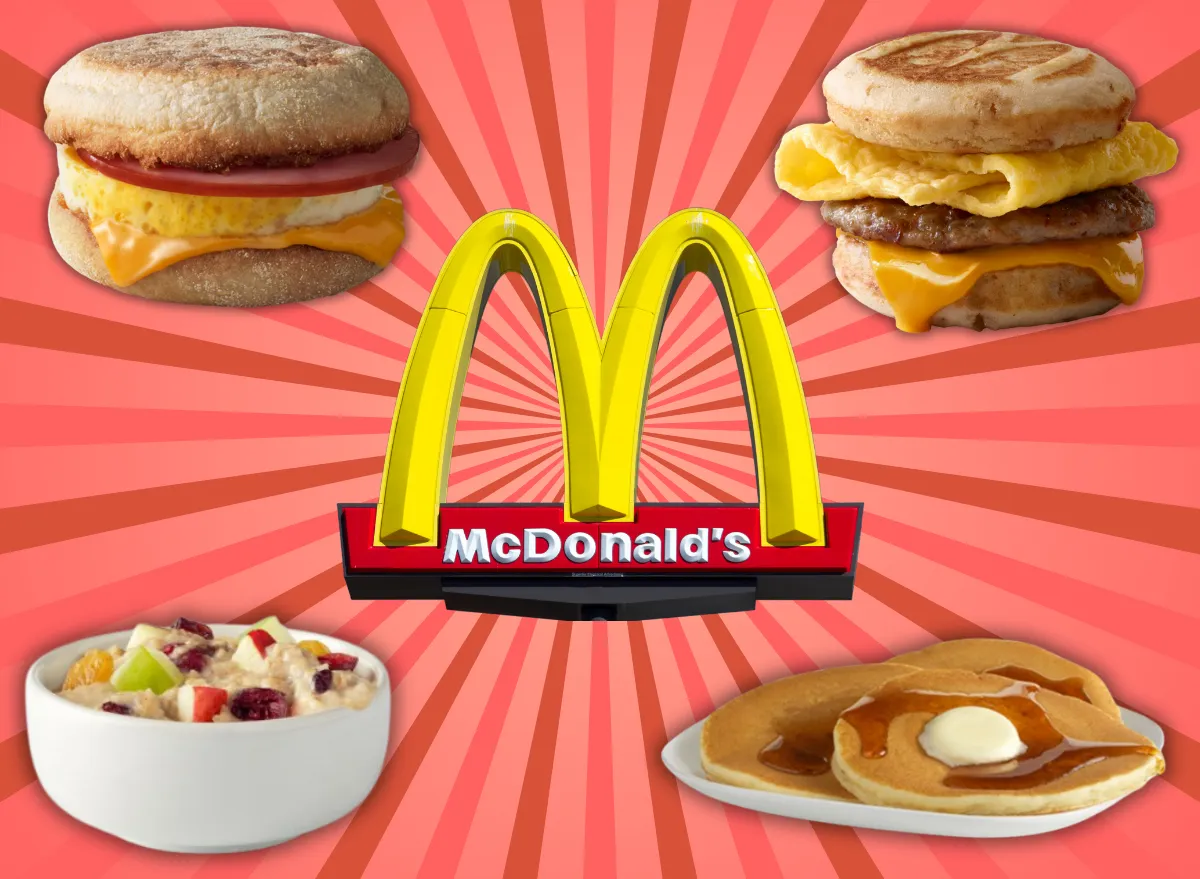
McDonald's may have gotten their start with burgers and fries, but today they are just as well known for their breakfast menu. Breakfast sandwiches and hotcake combos make up the bulk of their breakfast favorites, with other familiar items on the menu as well. When it comes to nutrition though, not all of these items are created equally. While some make for a balanced meal and can be paired with sides to create a heartier option, others are loaded with calories, fat, and sugar. Here's how to navigate the best and worst breakfast options on McDonald's breakfast menu.
You should limit nutrients like sodium, sugar, and saturated fat in your diet to help prevent chronic disease. Based on this, the menu items that have the highest amounts of these nutrients rank worst on our list. Alternatively, options with notable fiber and protein content rank better. The number of calories a food provides also plays a role in ranking. Items that provide a reasonable number of calories rank better than options that provide more energy than what most people require in a meal.
Keeping these factors in mind, here is the entire McDonald's breakfast menu ranked for nutrition. And for what to order after 11 a.m., check out The Best & Worst Menu Items at McDonald's, According to RDs.
The Unhealthiest McDonald's Breakfast Is… the Big Breakfast with Hotcakes
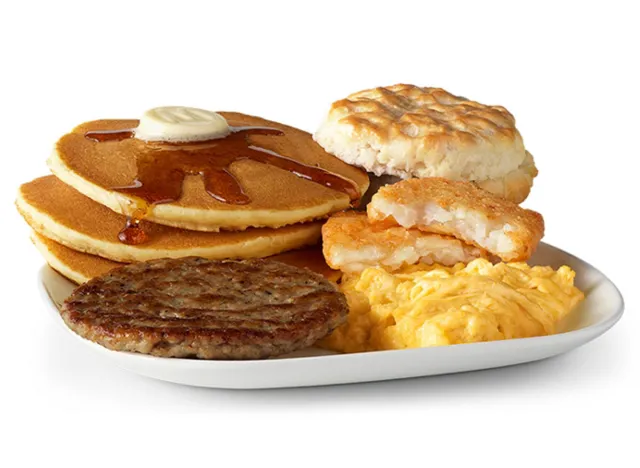
Calories: 1340
Fat: 63 g (Saturated fat: 24 g)
Sodium: 2070 mg
Carbs: 158 g (Fiber: 5 g, Sugar: 48 g)
Protein: 36g
There are very few people who can eat over 1,000 calories in a meal regularly while maintaining a healthy weight. This meal is over 1300 calories, a number that may be enough for a full day for some people. Not to mention, it also provides 41 grams of added sugar which is just shy of the recommended limit for an entire day. Unless you plan to split this meal amongst a few people, skip it and save your calories for a more nutrient-dense option.
Big Breakfast
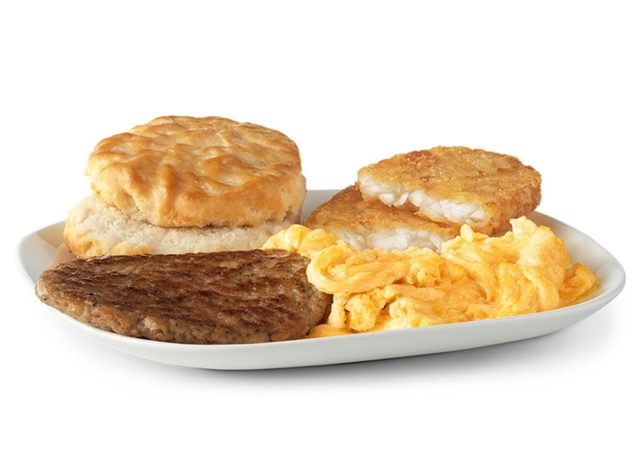
Calories: 760
Fat: 48 g (Saturated fat: 18 g)
Sodium: 1530 mg
Carbs: 57 g (Fiber: 3 g, Sugar: 3 g)
Protein: 26g
While this meal provides far less sugar than the Big Breakfast with Hotcakes, it still leaves much to be desired when it comes to nutrition. For over 700 calories, you get only 3 grams of fiber. For reference, adults should aim to get about 7 grams of fiber per 500 calories they eat, and most adults aren't eating enough of this important nutrient. In addition to a low fiber count, this meal also provides more fat than some people need in a full day of eating, let alone a single meal. Skipping the sausage in this meal cuts fat by about 18 grams while still maintaining 20 grams of protein. This customization makes the meal slightly healthier, but there are still better options on the menu.
Hotcakes and Sausage
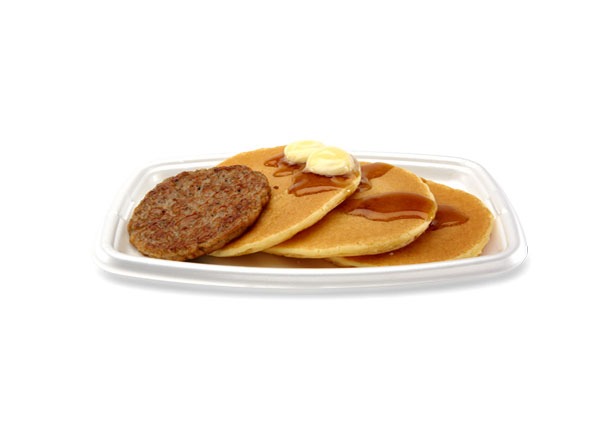
Calories: 770
Fat: 33 g (Saturated fat: 12 g)
Sodium: 810 mg
Carbs: 102 g (Fiber: 2 g, Sugar: 46 g)
Protein: 15 g
You'll find the hotcake meals are all poorly ranked on our list, and that is largely due to the sugar content. With nearly a day's worth of added sugar in a single dish, you're better off skipping the pancakes. Alternatively, you can skip the syrup to significantly reduce the added sugar in the meal, which makes it a much more reasonable choice. In this case, you'll still have a high fat and saturated fat content, even when cutting the syrup.
Hotcakes
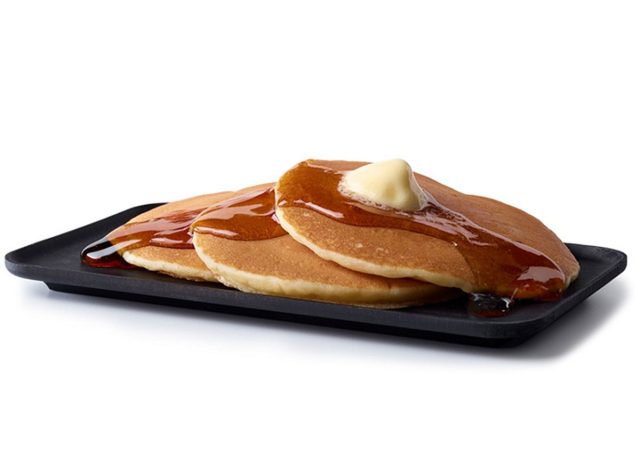
Calories: 580
Fat: 15 g (Saturated fat: 6 g)
Sodium: 530 mg
Carbs: 101 g (Fiber: 2 g, Sugar: 45 g)
Protein: 9g
Going with the plain hotcakes makes for a lower-calorie meal, although this comes at the expense of protein. With only 9 grams of protein in this meal, it hardly makes for a balanced option. Protein is an essential nutrient, and many adults should aim to have around 20 grams per meal to meet their minimum needs for the day. Even when you skip the syrup in this meal, you're left with inadequate protein to consider this a well-rounded meal.
Sausage, Egg & Cheese McGriddle
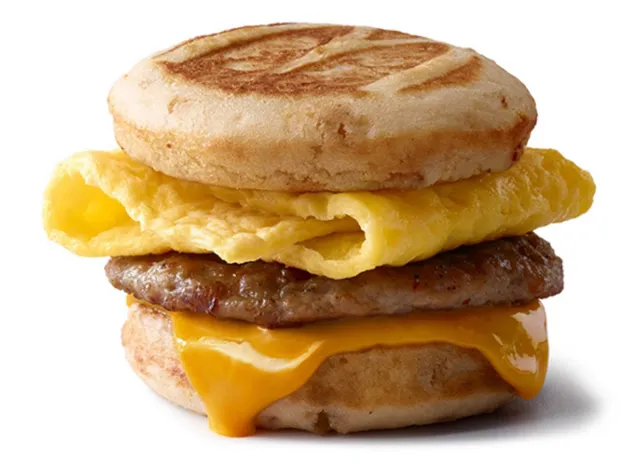
Calories: 550
Fat: 33 g (Saturated fat: 13 g)
Sodium: 1290 mg
Carbs: 33 g (Fiber: 2 g, Sugar: 15 g)
Protein: 19 g
A breakfast sandwich filled with savory ingredients and held together by griddle cakes with a hint of sweet maple syrup may sound like a dream, but this isn't the case when it comes to nutrition. With only 2 grams of fiber, this option doesn't make for a good quality source of carbohydrates. Additionally, 13 grams of saturated fat contributes over 50% of your daily recommendation in a single food. Skip the sausage and butter on this sandwich for a healthier option that is under 400 calories.
Bacon, Egg & Cheese McGriddle
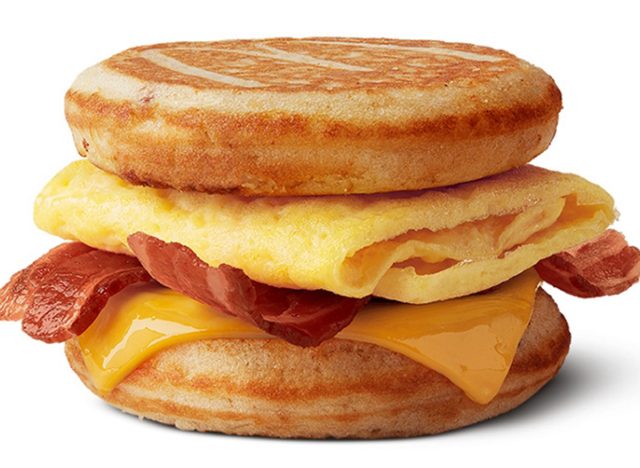
Calories: 430
Fat: 21 g (Saturated fat: 9 g)
Sodium: 1230 mg
Carbs: 44 g (Fiber: 2 g, Sugar: 15 g)
Protein: 17 g
Another McGriddle variety, this one includes bacon instead of sausage. This leads it to be lower in calories, fat, and saturated fat. Unfortunately, it still provides over 1,200 milligrams of sodium, which is more than half of your daily need. It is also a tad lower in protein and still provides 13 grams of added sugar. Skipping the bacon drops your meal to 360 calories and 15 grams of fat, but also sacrifices a few grams of protein. Check out the other sandwich options before going with the McGriddles.
Sausage McGriddle
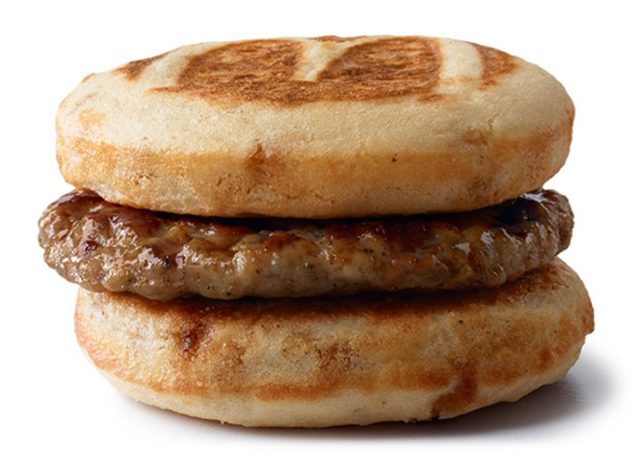
Calories: 430
Fat: 24 g (Saturated fat: 9 g)
Sodium: 990 mg
Carbs: 41 g (Fiber: 2 g, Sugar: 14 g)
Protein: 11 g
Simply made with griddle cakes and a sausage patty, this option is only slightly better than the other McGriddles on the menu. At 430 calories, this makes for a reasonable amount for many adults, but the composition of calories leaves much to be desired. A relatively low protein and fiber count makes this option less filling, and even though sodium is under 1,000 milligrams, this is still considered a high amount for a single meal.
Sausage Biscuit with Egg
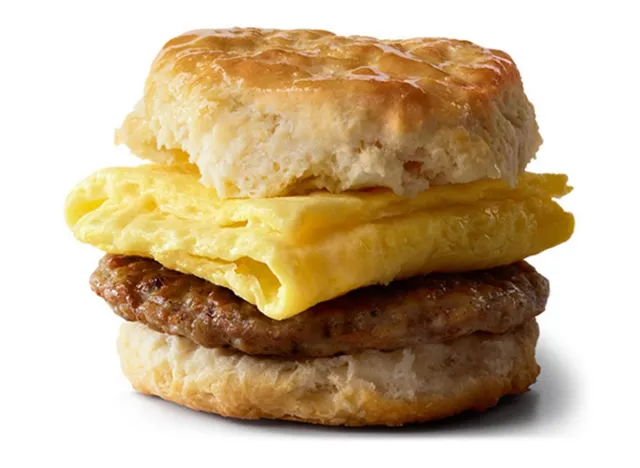
Calories: 530
Fat: 35 g (Saturated fat: 15 g)
Sodium: 1190 mg
Carbs: 38 g (Fiber: 2 g, Sugar: 3 g)
Protein: 17 g
Luckily, this breakfast sandwich only provides 1 gram of added sugar, making it a better sandwich than the McGriddles. Unfortunately, it is still lacking in fiber and provides high sodium, fat, and saturated fat content. To improve this option, skip the sausage and add a side of plain Greek yogurt from home for a boost of protein without the fat and sodium.
Sausage Biscuit
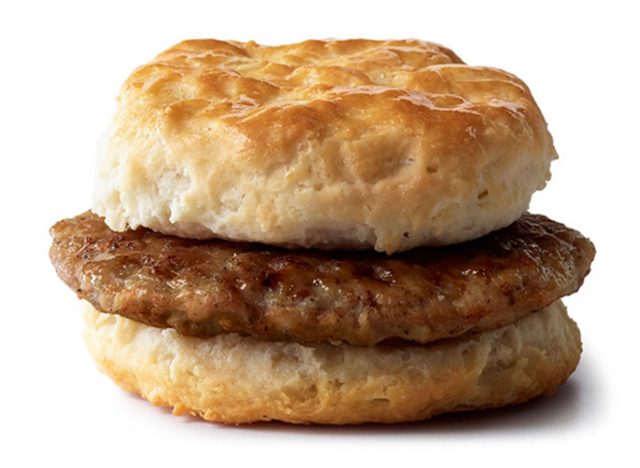
Calories: 460
Fat: 30 g (Saturated fat: 13 g)
Sodium:1090 mg
Carbs: 37 g (Fiber: 2 g, Sugar: 2 g)
Protein: 11 g
Although 460 calories is appropriate for a meal for many adults, the lack of protein and fiber in this McDonald's breakfast menu option makes it less desirable. Unfortunately, there aren't many modifications that improve this meal, either. You could skip half of the biscuit and get your carb from a serving of fruit and plain Greek yogurt you bring from home. This improvement will add fiber and protein without increasing the calorie count too much.
Bacon, Egg & Cheese Biscuit
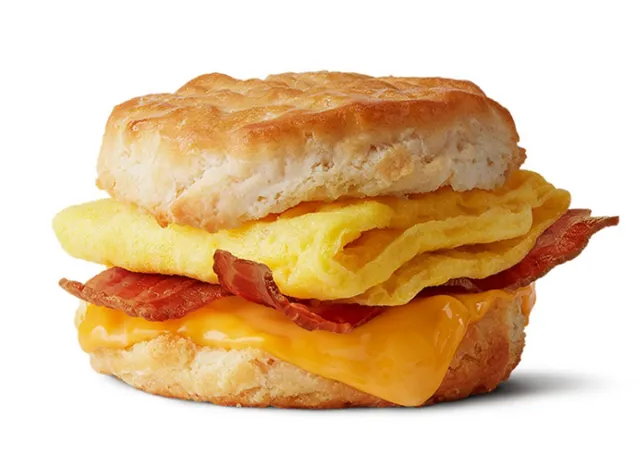
Calories: 460
Fat: 26 g (Saturated fat: 13 g)
Sodium: 1330 mg
Carbs: 39 g (Fiber: 2 g, Sugar: 3 g)
Protein: 17 g
Although bacon is considered to be a fatty cut of meat, it generally provides fewer grams of fat and saturated fat than sausage. At under 500 calories, this sandwich is reasonable from an energy perspective but is still lacking in the nutrient department. To save a little fat in this meal, skip the butter, and add some fruit from home for a fiber boost.
Hash Browns
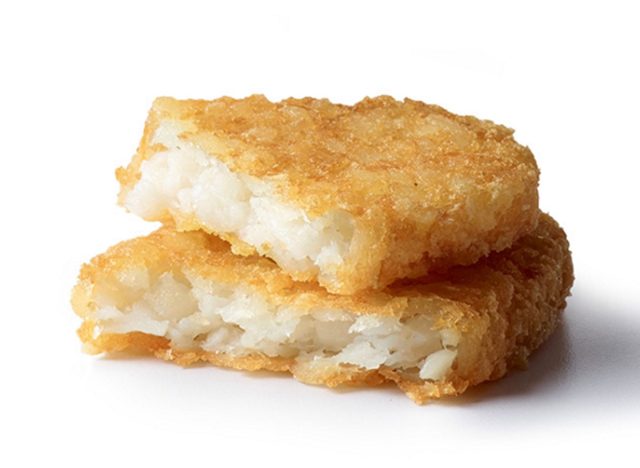
Calories: 140
Fat: 8 g (Saturated fat: 1 g)
Sodium: 310 mg
Carbs: 18 g (Fiber: 2 g, Sugar: 0 g)
Protein: 2 g
Hash browns aren't considered to be a complete meal on their own, but they can be a reasonable side to a lean protein and some fruit. If you are craving potato at your breakfast, a side order of hash browns from McDonald's breakfast menu is a reasonable choice. With a couple of grams of fiber and no added sugar, they can complement a lean protein from home, like egg whites scrambled with veggies, and another source of fiber, like fruit.
Sausage McMuffin
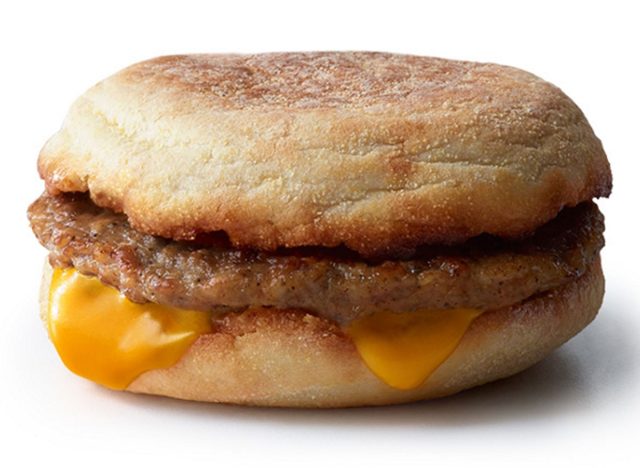
Calories: 400
Fat: 26 g (Saturated fat: 10 g)
Sodium: 760 mg
Carbs: 29 g (Fiber: 2 g, Sugar: 2 g)
Protein: 14 g
Although 400 calories is good for a meal, this sandwich only provides 14 grams of protein. This could lead to a less satiating meal, especially when combined with low fiber content. The lower sodium content compared to other sandwiches so far is notable; however, a couple of modifications could make this option better. Skip the cheese and butter on the sandwich to make a 330-calorie sandwich that allows you to add a lean protein and fruit from home for a better meal.
Sausage McMuffin with Egg
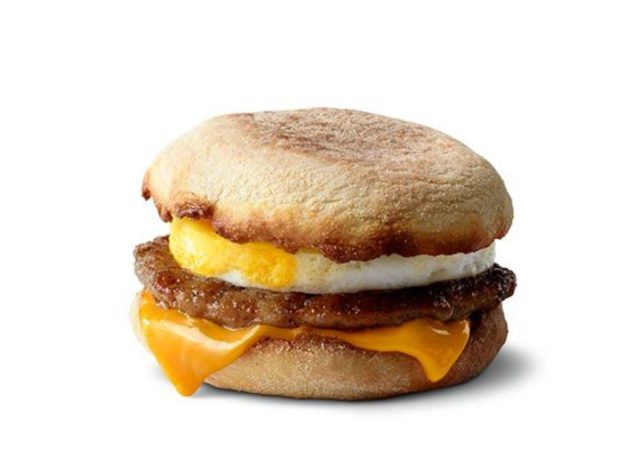
Calories: 480
Fat: 31 g (Saturated fat: 12 g)
Sodium: 830 mg
Carbs: 30 g (Fiber: 2 g, Sugar: 2 g)
Protein: 20 g
Of all the breakfast sandwich on the McDonald's mean, the McMuffins are the best from a nutritional standpoint. They provide fewer grams of saturated fat and less sodium, and higher protein content. While the sausage here keeps saturated fat higher than is ideal, it still makes for a decent choice. Skipping the cheese on this sandwich will drop saturated fat by 2 grams while keeping protein at 18 grams, making it a slightly healthier option.
Fruit & Maple Oatmeal
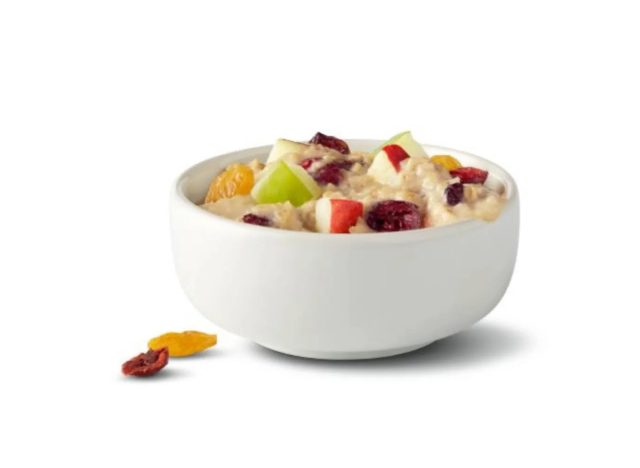
Calories: 320
Fat: 4.5 g (Saturated fat: 1.5 g)
Sodium: 150 mg
Carbs: 64 g (Fiber: 4 g, Sugar: 31 g)
Protein: 6 g
On its own, oatmeal is a great quality carb known for its fiber content. Unfortunately, in this menu item, the oatmeal contains 18 grams of added sugar. This is far less than many other items on McDonald's breakfast menu but keeps this option from ranking higher on our list. Additionally, this oatmeal's low fat and protein content makes it less balanced than other options. Skip the cranberry and raisin blend to cut added sugar, and add some nuts from home for an easy source of protein and fat to improve this option.
Sausage Burrito
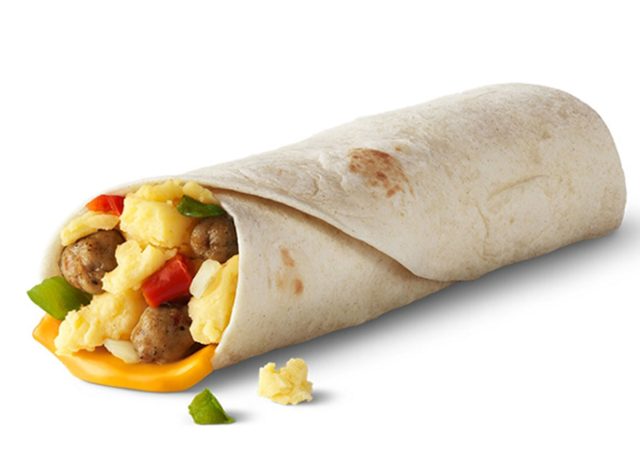
Calories: 310
Fat: 17 g (Saturated fat: 7 g)
Sodium: 800 mg
Carbs: 25 g (Fiber: 1 g, Sugar: 2 g)
Protein: 13 g
This single breakfast burrito is a great option for a meal. The calorie content allows you to add healthy sides from home to make for a balanced meal, and the starting nutrient numbers of this option are much better than others on the menu. A small portion of nuts will increase fiber and protein, and a small serving of fruit adds fiber and other micronutrients to create a well-rounded meal.
The Healthiest McDonald's Breakfast Is… the Egg McMuffin
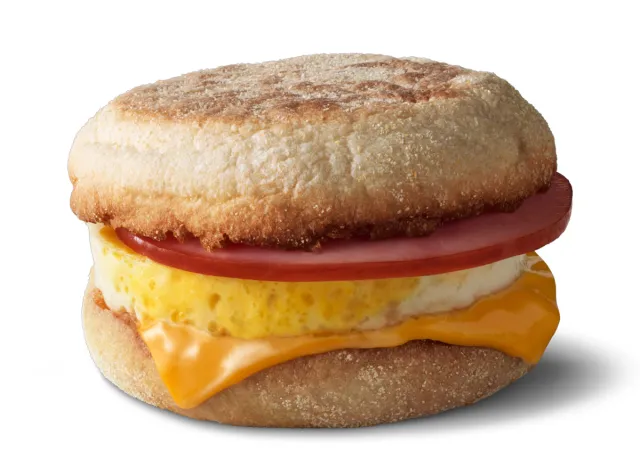
Calories: 310
Fat: 13 g (Saturated fat: 6 g)
Sodium: 770 mg
Carbs: 30 g (Fiber: 2 g, Sugar: 3 g)
Protein: 17 g
The best option on the McDonald's breakfast menu is the classic Egg McMuffin. A reasonable calorie count, and grams of fat and saturated fat help this option make the top of our list. Not to mention, it meets protein needs for many and provides only 1 gram of added sugar. What this option is missing is fiber, so consider fruit from home as a side to boost fiber in the meal while staying under 400 calories.

